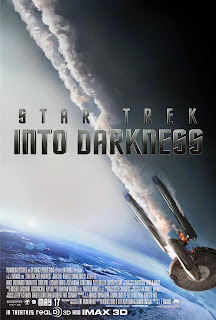The movie begins in the middle of an action scene, so characters are forced to say awkward expositional statements in their dialogue in order to catch up the audience. Despite that, the movie starts off strong for about the first half-hour. Then everything goes wrong. I have read and watched a lot of reviews for the movie, and I have not seen anybody point out the major story flaw I am about to point out.
At the 29-minute mark, Kirk breaks down over Admiral Pike's dead body. Clearly he is emotionally compromised. And what did the previous movie establish about being emotionally compromised?
Spock Prime: [Regulation] Six-one-nine states that any command officer who's emotionally compromised by the mission at hand must resign said command.
A major plot point of "Star Trek" was that Kirk had to show that Spock was emotionally compromised so that Kirk could take control of the Enterprise. And yet, when Kirk became emotionally compromised, he was given command of the Enterprise anyway, and nobody objected. I have gone ahead to rewrite three scenes the way they should have happened. (My additions are in italics):
Bones: Where were you?
Kirk: For what?
Bones: Your medical exam. Ten hours ago you were in a firefight. Now it's my duty as ship's...
Kirk: I'm fine, Bones.
Bones: The hell you are. You have been emotionally compromised and are no longer fit for duty.
Kirk: I'm fine.
----- Spock: Captain. Thank you for requesting my reinstatement. As I am again your First Officer, it is now my duty to inform you that you are emotionally compromised and advise that you should relinquish your command.
----- Uhura: Captain! I'm so sorry about Admiral Pike.
Kirk: We all are.
Uhura: Are you okay?
Kirk: Fine, thank you, Lieutenant.
Uhura: Captain, I know that you were close with the admiral. And I know it isn't my place to say this, but I think that you may be emotionally compromised.
Kirk: You are right, Lieutenant. It isn't your place. Now, tell me all the intimate details about your relationship with Spock.
If all three attempts didn't work there should have been a non-mutinous way for his crew to hold an intervention for him. But all of his crew just let him make some very bad decisions when any of them could have stopped it.
The next big problem was the villain. It was no surprise that the villain turned out to be Khan. In November of 2009, I went on the IMDb page for the "Untitled Star Trek Sequel" before any official information had been released about the movie. All it had for the cast was "Nestor Carbonell - Khan (rumored)"1. That was wrong. By the time that the movie was finally written and ready to into pre-production, Benecio Del Toro was rumored to be cast as the villain, and speculation again was that Khan would be the villain. In the end, Benedict Cumberbatch was cast as John Harrison.
I had hoped that the new Star Trek movie would have an original villain like the previous movie had. There was no reason for Khan to be in the second movie of the new continuity just because he was in the original second movie. And essentially he wasn't truly Khan. Just because the timeline was changed sometime around Kirk's birth does not mean that the changes would go back to the 1940s-1990s to change Khan from a Mexican-Indian to a British-Indian.
But the biggest problem with Khan Harrison was that he is the most honest movie villain since Satan in "Suing the Devil". Seriously, every single thing Khan says is true. He does not try to manipulate anybody through deception. He saves Uhura, Kirk, and Spock from Klingons, he willingly surrenders to them, he reveals his motivation to Kirk and shares that Admiral Marcus is the real bad guy, and Khan only really becomes evil once Marcus was taken out and he had a position of power. Khan Noonien Singh is considered the greatest Star Trek villain, but Khan Harrison is not.
The final problem I am going to bring up is really a minor nitpick. At the end of the movie, Kirk recites the "Space. The Final Frontier." monologue as the "Captain's Oath". I have no idea how that counts as an oath. There is no promise anywhere in those words. That just bugs me.
Even though the majority of the story logically shouldn't have happened, the story was created to serve the villain instead of the other way around, and the writers couldn't think of a clever way to work the "final frontier" monologue into the script (along with a whole list of other problems I am not bringing up), "Star Trek Into Darkness" is a really good movie that is fun to watch over and over. If JJ Abrams can take a terrible script and turn it into an amazing movie, then we should have no worries about "Star Wars: The Force Awakens".
I give "Star Trek Into Darkness" an 8/10.
Notes:
1. Really good casting idea, whoever put that on there. I think that could have worked, had the actual Khan been used.

No comments:
Post a Comment